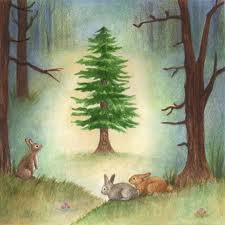The Little Fir Tree: A Fairy Tale
Editor’s Preface: Manfred Kyber (1880-1933) was born in Riga, now the capital of Latvia, but then a part of Russia. His family was German and when he was still a small boy they moved back to Germany. He studied philosophy at the University of Leipzig and later moved to Berlin where he published a novel, poetry, and theater criticism. He married Elisabeth Boltho, a Theosophist through whom he met Rudolf Steiner, the Austrian philosopher and mystic, and became associated with the anthroposophical movement, which Steiner led. Kyber was not only a pacifist but an outspoken early proponent of animal rights. As well as poetry and novels, he published several volumes of fables and fairy tales, many of which have been translated into English. See the note at the end for links and further details about the translation and translator. Please note that we have also posted two other fairy tales by Kyber, “The Daily Work before Sunrise”, and “The Key of Heaven”. WJJ

Illustration courtesy damaridemarangelli.carbonmade.com
Once upon a time, deep in a forest of firs, there was a little fir tree who yearned to be a Christmas tree. But that is not as easy as most things in the community of trees, because Saint Nicholas is very firm in regard to his policies, and allows only those trees which have been duly recorded in his book to go into towns and cities as Christmas trees.
The book is frightfully thick, as is proper for a good old saint, and Saint Nicholas takes it with him into the woods on clear cold winter nights and records which trees are to be chosen for the Christmas celebrations.
And the trees, thrilled that they have been chosen for Christmas Eve festivities, bow before him in gladness to thank him, and then the saint’s halo glows, and that is very beautiful, and very solemn.
Now this little fir tree deep in the forest of firs yearned to be a Christmas tree. But for many years Saint Nicholas, when passing by the little fir tree in the clear cold winter nights, had said nothing, absolutely nothing. The poor little fir tree had not been noticed, and so he became very, very sad, and began weeping and weeping, and all his branches trickled with tears.
When someone weeps so much that he begins trickling, someone is bound to hear it. Indeed, this weeping could be heard by a small gnome. He wore a green moss cloak, had a grey beard, and a flame-red snout, and lived in a dark hole.
This little fellow ate hazel nuts, preferably whole, and read books, preferably thick, and he was quite a curmudgeonly little creature. But he wanted to be nice to the fir tree because it often gave him a pair of green needles for his glass pipe, from which he always blew ringlets of smoke-clouds in the golden sunlight. And for that reason when he heard the fir tree weeping miserably the little creature immediately came out and asked: “Why do you cry so much that you trickle?”
Then the fir tree stopped weeping and told the little fellow his heartache. The creature became quite serious, and his red nose glowed so much that you would have thought that his moss cloak might catch fire. But it was really the fire of sympathy that was glowing, and that is not dangerous.
The gnome was inspired by the little fir tree deep in the forest of firs desiring so deeply to become a Christmas tree. The gnome stood upright, gulped importantly several times, and choosing his words carefully said, “My dear little fir tree, it is quite impossible for anyone to help you. But I am who I am, and so, maybe it is possible for me to help you! I just happen to be acquainted with some candles, one of which is nicely colored, and I shall ask them to come see you. Also, I know a great big gingerbread heart, who certainly is fickle, but anyway, I shall see what might be possible. Before anything else though, please don’t weep so terribly that you trickle!”
Thereupon the little creature took an icicle in his hand as a walking stick and hiked off through the deep white snow-covered forest towards the distant town. He continued on, walking far, very far, and before long the first stars of the holy night of Christmas Eve looked down from heaven through the wintry grey twilight to the earth below. And the little fir tree was already quite sad again, saying that once more it would not be a Christmas tree.
But then, quite quickly, a small party plodded through the snow—it was the gnome with the icicle in his hand, and behind him seven candles, and also a matchstick case was nearby, upon which a fancy design was impressed—the matchstick case had such tiny little legs that it could only stagger through the snow with immense difficulty.
Now as they all stood before the little fir tree, the gnome in the moss cloak cleared his throat, noisily gulped several times quite importantly, and then said: “I am who I am, and so all of my acquaintances have come with me. They are seven little candles, all of excellent wax, among whom there is even a colored one; and also this matchstick case, which is from quite a good and distinguished family—for it strikes up warm relationships exclusively by making contact only with the right striking surfaces. And so, now you will be a Christmas tree! But what the big gingerbread heart intends to do I don’t know exactly, even though he has also promised to come. You see, he wants to buy himself a pair of warm felt boots, because it’s quite cold out here in the forest. He’ll be along soon, I expect. He has made a condition though: he must be eaten, for all gingerbread hearts must, and that is the case with this one too. I have already informed a badger whom I know quite well (and once gave advice to in some family affairs). He’s asleep now, hibernating, but he promised me when I woke him up that he would eat the gingerbread heart. I sure do hope he doesn’t sleep his chance away.”
As soon as the little fellow had said all this he cleared his throat again noisily and gulped quite importantly, and then he disappeared into his cave.
The candles hopped up onto the little fir tree and the matchstick case, which had come from such a good family, pulled one matchstick after another from its stomach, struck them on the brown striking surface, and lit all the candles, one after another.
And as the lights burned and illuminated the deep forest there was a gasping and wheezing that could be heard. Huffing and puffing, breathless from hurrying, the gingerbread heart arrived and attached himself very happily and contentedly halfway up the green fir tree, despite the fact that now his felt boots had been lost along the way and it was terribly cold.
The little fir tree had yearned to be a Christmas tree, but didn’t know how it all had happened that now he actually was a Christmas tree.
On the next day, in the morning, the badger crept out from his hole to fetch the gingerbread heart. But when he got there to eat it, the little angels had already eaten it up. They are permitted to spend time on earth on the holy night of Christmas Eve, and so with great pleasure they had consumed the gingerbread heart. Then the badger became very angry, and he insulted the little fir tree quite meanly. But to the little fir tree it was all one and the same, for someone who has truly celebrated his holy Christmas Eve even once in his life is no more disturbed by insolent badgering.
A NOTE ON THE TEXT: The German original of this story, “Der Kleine Tannenbaum”, was published in Märchen, Stuttgart/Heilbronn: Walter Seifert Verlag, 1922.
EDITOR’S NOTE: Besides the information given in the Preface, we might also recommend this informative German language site on Kyber’s life and writings. There is also an amazon.com page listing some of Kyber’s English language editions. “The Little Fir Tree” has been newly translated from the German by our Literary Editor, William J. Jackson. For further information about William, and links to his other postings, please click on this Author’s Page link.




